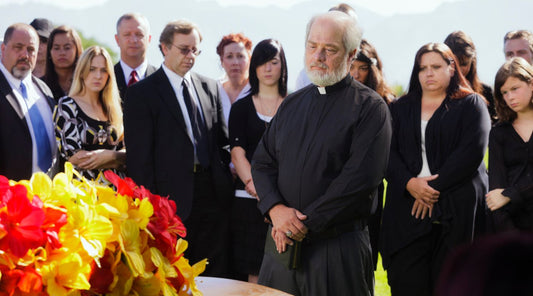
How to Write a Funeral Speech When You're at a Loss for Words (Real Examples Inside)
Staring at a blank page, trying to figure out how to write a funeral speech? Trust me, you're not alone in this. Even professional writers hit a wall when it comes to putting their feelings into words for someone they've lost.
Here's the thing – there's no "perfect" funeral speech. What matters is speaking from your heart, even if your voice shakes a bit. Modern eulogies are moving away from strict formality, and it's totally okay to include moments of gentle humor alongside the tears.
I've helped countless people write funeral speeches, and I'll tell you what I tell them: forget about fancy words or sounding "proper." Instead, let's focus on sharing real memories that make people nod and smile through their tears.
In this guide, we'll walk through everything step by step. No fancy jargon, no complicated rules – just practical help for when you need it most. Whether you've got two weeks or two days to prepare, I've got your back.

Getting Started When Words Don't Come
Let's be real – figuring out how to write a funeral speech often feels like trying to climb a mountain with your hands tied. But here's a simple way to start: grab your phone or a notebook and find a quiet spot. No pressure to write anything perfect yet.
First up, ditch the formal writing rules you learned in school. This isn't an essay – it's a chance to share memories. Start by jotting down single words or phrases that pop into your head about the person. Could be anything – their laugh, their favorite dad joke, or that weird way they folded pizza before eating it.
Stuck? Try this: set a timer for 5 minutes and write whatever comes to mind. Don't judge what comes out – just let it flow. Some of my clients find it easier to record themselves talking instead of writing. Both ways work great.
For length, aim for about 5-7 minutes of speaking time. That's roughly one typed page, double-spaced. But here's the thing – quality beats quantity every time. A short, heartfelt funeral speech always wins over a long-winded one.
Remember, you're not writing a biography. You're sharing a piece of your heart, and that's exactly what everyone needs to hear.

Gathering Your Thoughts
Now that you've started thinking about how to write a funeral speech, let's make it easier to organize those memories floating around in your head. Think of it like putting together a photo album – one memory at a time.
Grab your phone and create a notes file (or use good old pen and paper). Start with these memory-joggers:
- Their classic sayings or catchphrases
- Funny moments you shared
- Times they helped you out
- What made them unique
- Their quirky habits
Here's a trick that works wonders: reach out to family and friends for their stories. Send a quick text like "What's your favorite memory of [name]?" You'll be amazed at the stories that come flooding in. Sometimes the best material comes from others.
Don't worry about organizing yet. Just collect everything – the big stories and tiny details. That time they burned the Thanksgiving turkey? Write it down. The way they always wore mismatched socks? That too.
When you're ready to organize, try this simple approach:
- Group similar stories together
- Pick the ones that show their character best
- Choose moments most people can relate to
- Include at least one light-hearted memory
Pro tip: Voice notes are gold here. Sometimes talking it out helps more than writing. Walk around your house or garden and just chat about them like they're still here. You'd be surprised how naturally the stories flow.
Writing the Speech
Okay, you've got your memories gathered – now let's shape them into a funeral speech that feels right. Let's break it down into bite-sized pieces.
Opening (First 30 seconds): Start with something simple like "Hi, I'm [name], and [person's name] was my [relation]." Then add a line that captures their essence. Maybe "Mom could light up any room with her terrible dad jokes" or "Uncle Jim never met a stranger he couldn't turn into a friend."
Middle (The Heart of Your Speech): This is where your collected stories come in. Pick 2-3 moments that really show who they were. Mix it up:
- One funny story (like their epic cooking fails)
- One heartwarming moment (how they helped you through tough times)
- One everyday memory (their morning coffee ritual)
Here's a pro tip: connect your stories. Instead of "And another time..." try "Speaking of his love for dogs..." It helps your speech flow naturally.
Don't worry about making it perfect. Raw and real beats polished and distant every time. If you're stuck on how to write a funeral speech that feels genuine, imagine you're just telling these stories to a friend over coffee.
Ending (Last 30 seconds): Keep it simple and heartfelt. You might say:
- What you'll miss most about them
- A final thank you
- Their favorite saying
- A simple "We love you and we'll miss you"
Quick Formatting Tips:
- Write like you talk
- Use bigger font (16pt) for easy reading
- Double space your lines
- Mark pause points with //
Remember: you're not writing a biography – you're sharing why this person mattered. Sometimes the smallest details make the most impact, like how they always saved the crossword puzzle for Sunday morning coffee.
Real Examples with Analysis
Let's look at two real funeral speeches and break down why they work. This will help you see how to write a funeral speech that connects with people.
Example 1: For a Parent "Dad wasn't perfect – and he'd be the first to tell you that. He burned every BBQ, told the same terrible jokes for 40 years, and never did figure out how to program the TV. But he showed up. Every game, every school play, every time we needed him. That's who he was – consistently, wonderfully there."
Why it works:
- Starts with humor
- Balances flaws with strengths
- Uses specific details
- Shows character through actions
Example 2: For a Friend "Sarah lived life in exclamation points. She didn't just like movies – she LOVED them. She didn't just smile – she lit up rooms. Even her text messages came with at least three happy faces. In our 15-year friendship, I never once saw her do anything halfway."
Why it works:
- Strong imagery
- Specific personality traits
- Personal perspective
- Consistent theme
Key Takeaways:
- Keep it real (skip the fancy words)
- Mix emotions (it's okay to make people smile)
- Use everyday details
- Show, don't tell
Remember: the best funeral speeches aren't about listing achievements. They're about capturing someone's spirit. Think about what made them uniquely them – their quirks, habits, and the little things that made them special.
Pro tip: Notice how both examples use present tense sometimes? It helps keep memories alive and feels more immediate.

Practical Tips for Delivery
You've figured out how to write a funeral speech – now let's tackle delivering it. Print your speech in large font (16pt minimum) and bring two copies, just in case.
Keep water nearby and take deep breaths before starting. If you get emotional, that's completely normal. Pause, take a sip of water, and continue when ready. The audience is on your side.
Pro tip: Practice reading it out loud at least twice before the day. And here's a game-changer – ask someone to stand in the back during the service. Focus on them if you're feeling overwhelmed.
If emotions take over, have a backup person ready to step in and finish for you.
Common Pitfalls to Avoid
When learning how to write a funeral speech, knowing what not to do is just as important as knowing what to do. Here are the big no-no's:
Don't Turn it Into a Resume Skip the long list of achievements and job titles. Focus on who they were, not what they did.
Avoid These Topics:
- Family drama or conflicts
- Money matters
- Their final illness details
- Inside jokes only few people get
Keep It Real Don't use fancy words just because it's a formal occasion. If you wouldn't say "thereafter" in regular conversation, don't use it here.
Watch The Length A funeral speech isn't a TED talk. Five minutes is plenty – people remember short and sweet better than long and detailed.
Skip The Clichés Instead of "they're in a better place," share a specific memory that shows what made them special. Your personal stories mean more than standard phrases.
Final Writing Tips
Read It Out Loud This is non-negotiable. Reading aloud helps you catch awkward phrases and lets you time it perfectly. Record yourself on your phone – you'll hear things you missed when reading silently.
Quick Editing Checklist:
- Cut any sentences longer than two breaths
- Replace fancy words with simple ones
- Mark natural pause points
- Highlight words you want to emphasize
Get a Second Opinion Ask someone who knew the person to listen to your speech. They might remember details you forgot or help you fine-tune the tone.
Format for Success:
- Use 16pt font minimum
- Double space everything
- Print on card stock (it doesn't shake like regular paper)
- Number your pages
Last tip: Trust yourself. You knew this person. Your words, your memories, your way of telling their story – that's exactly what everyone needs to hear.
Conclusion
Writing a funeral speech might feel overwhelming, but you've got this. Remember, there's no "perfect" way – just your way of sharing memories that matter. If you need more guidance, our team at TrustedCaskets is here to help, not just with caskets, but with all aspects of funeral planning, including speech writing resources.
Keep it simple, speak from your heart, and know that your words will bring comfort to others. The most powerful funeral speeches aren't the most polished – they're the most genuine.
And if your voice shakes or tears come? That's just love speaking.
For more resources on funeral planning and support, visit TrustedCaskets.com, where we understand that every detail matters in honoring your loved one.


